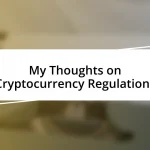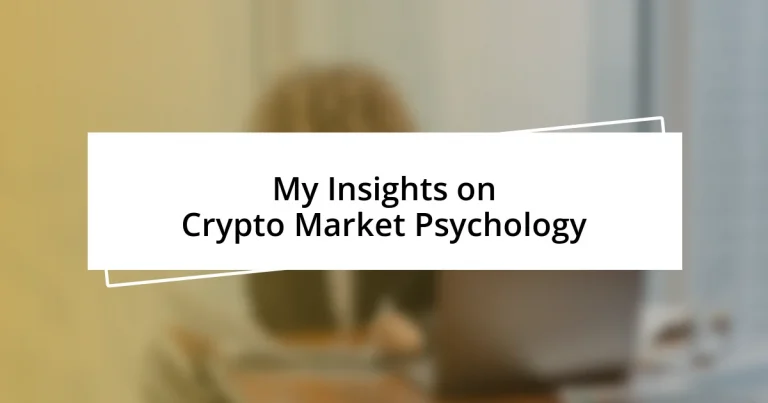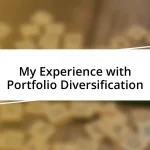Key takeaways:
- Market psychology, driven by collective emotions like fear and greed, significantly influences trading decisions, often leading to irrational behaviors such as panic selling and reckless buying.
- Adopting a long-term perspective can help traders minimize stress from market volatility and capitalize on potential gains, contrasting with the emotional turmoil of short-term trading.
- Building psychological resilience through self-care practices, maintaining a trading journal, and cultivating a supportive community are essential strategies for effective decision-making in the crypto market.

Understanding Market Psychology
Market psychology is fascinating because it often drives prices more than fundamentals do. I remember when Bitcoin hit a new all-time high; the excitement was palpable. I found myself constantly checking my portfolio, like many others, caught in the whirlwind of euphoric anticipation. It made me wonder—how much of our trading decisions are influenced by collective emotions rather than rational evaluations?
This collective mindset is pivotal in understanding market trends. I’ve witnessed firsthand how fear can lead to panic selling, even when the underlying assets remain strong. Have you ever sold an asset at a loss simply because everyone else seemed to be doing so? It’s curious how our emotions can overshadow our strategies, sending us spiraling into a frenzy of doubt and second-guessing.
Moreover, the concept of herd mentality plays a significant role in crypto markets. During bearish trends, I’ve found myself hesitating to buy when the prices drop, despite knowing that historically, it’s often the best time to accumulate. Isn’t it interesting how the fear of missing out can push us to ignore our well-laid plans? Understanding these psychological triggers is essential if we aim to navigate the crypto landscape with confidence and clarity.
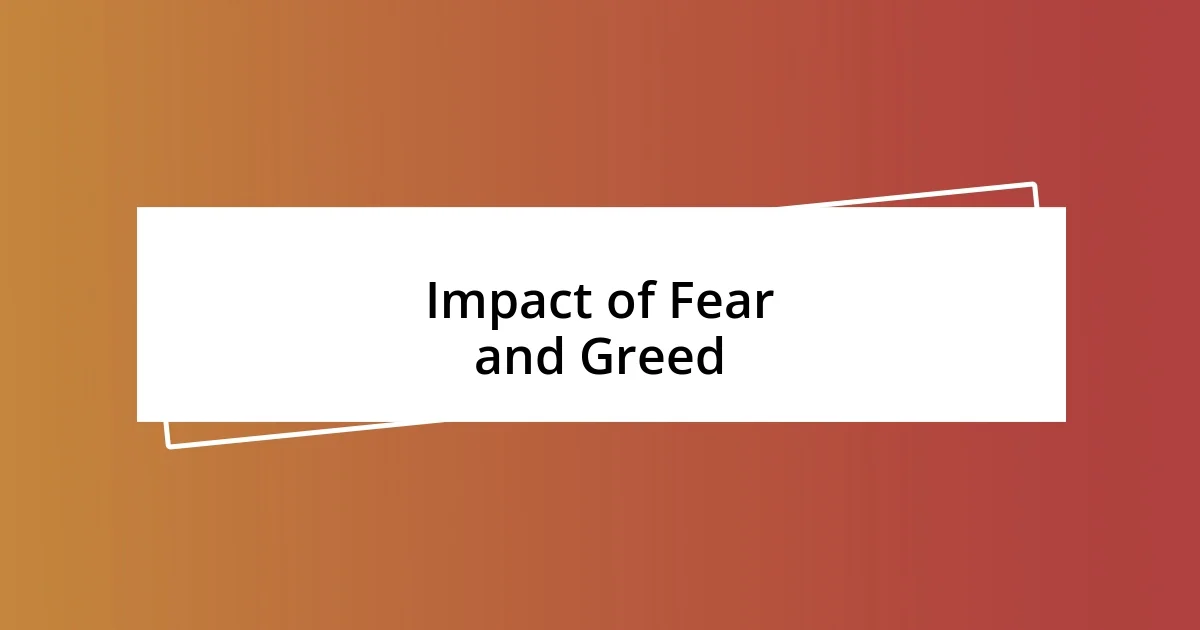
Impact of Fear and Greed
Fear and greed are two powerful emotions that can have a profound impact on trading behavior in the crypto market. I remember vividly a time when I got swept up in a buying frenzy during a bull run. Prices soared, and the excitement was infectious. But I quickly learned that this euphoria could lead to reckless decisions. The aftermath often left many of us staring at considerably diminished portfolios when those prices inevitably corrected.
On the other hand, fear can be equally daunting. I once held a position that seemed solid until the market dipped sharply overnight. The panic among my peers was palpable, and instead of holding steady, I succumbed to the urge to sell, driven by the fear of further losses. This experience taught me how crucial it is to maintain a discipline rooted in strategy, rather than react impulsively to prevailing emotions.
Navigating between fear and greed in the crypto space can be a rollercoaster ride. I’ve often noticed how when fear is predominant, many traders overlook purchasing opportunities because they’re too afraid of getting burned. Yet when the tide turns to greed, it can propel prices to unrealistic levels, often leading to a painful correction. Such emotional swings influence everyone, often leading to decisions that contradict our better judgment and strategies.
| Emotion | Impact on Trading |
|---|---|
| Fear | Panic selling, missed buying opportunities, rash decisions |
| Greed | Overtrading, inflated expectations, potential for significant losses |
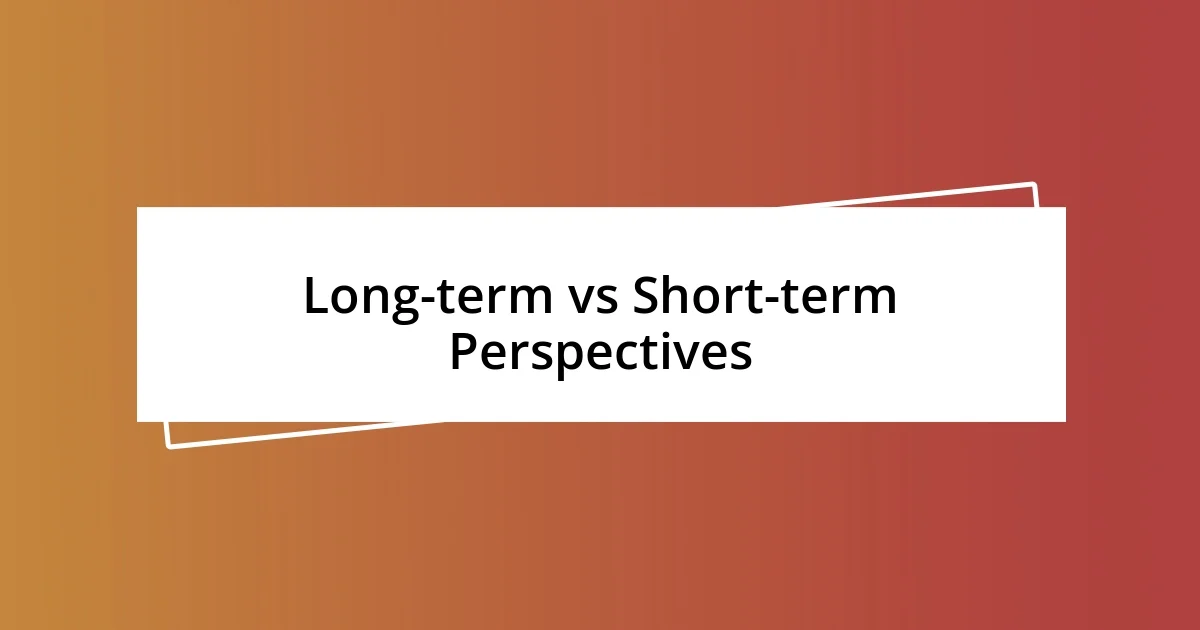
Long-term vs Short-term Perspectives
When it comes to perspectives in the crypto market, I find that short-term views often lead to an emotional rollercoaster. I’ve experienced this firsthand during rapid price fluctuations. One moment, I felt invincible with my trades and the next, panic set in as values plummeted. My focus on immediate gains blinded me to the broader picture and ultimately resulted in missed opportunities for long-term rewards.
In contrast, adopting a long-term perspective can be liberating. I recall a period when I decided to “set and forget” my investments in a promising project. This choice allowed me to resist the noise of daily volatility. Focusing on fundamentals rather than short-term price movements often minimizes the anxiety that can come with trading. Here are some reflections on the two perspectives:
-
Short-term trading:
- Driven by market trends and volatility.
- Often results in emotional trading decisions.
- Can lead to quick profits but higher risks.
-
Long-term investing:
- Encourages a focus on overall project fundamentals.
- Reduces stress from daily market fluctuations.
- May yield more substantial returns over time despite the wait.
Each perspective has its merits, but I’ve learned that balancing both can foster a healthier relationship with investments.

The Role of Herd Behavior
Herd behavior is a fascinating phenomenon in the crypto market that often leads traders to follow the crowd instead of sticking to their original plans. I can recall an instance when I watched a group of friends jump into a trending altcoin without doing thorough research. Their excitement was contagious, and I found myself thinking, “Maybe I should join them!” Eventually, that particular asset plummeted, and I was left questioning whether my own due diligence had gone out the window simply because of others’ enthusiasm.
The impact of herd behavior can create significant market swings, amplifying both euphoric highs and devastating lows. I still remember a scenario where a sudden surge in price got everyone buzzing. It felt like we were on a rollercoaster ride, spiraling upward until reality hit—many were left stuck with losses when the frenzy fizzled. It made me realize that engaging in the herd can feel exhilarating, but it can lead us astray from our own rational assessments.
Why do we allow external influences to dictate our decisions in such a volatile environment? The reality is that it’s easy to get swept away by popular sentiment, especially when everyone appears to be making money. What I’ve learned is that staying grounded amidst the chaos is crucial. By reminding myself to question the herd mentality, I can pave my own path and make decisions that align better with my individual strategy, rather than being swayed by the noise around me.
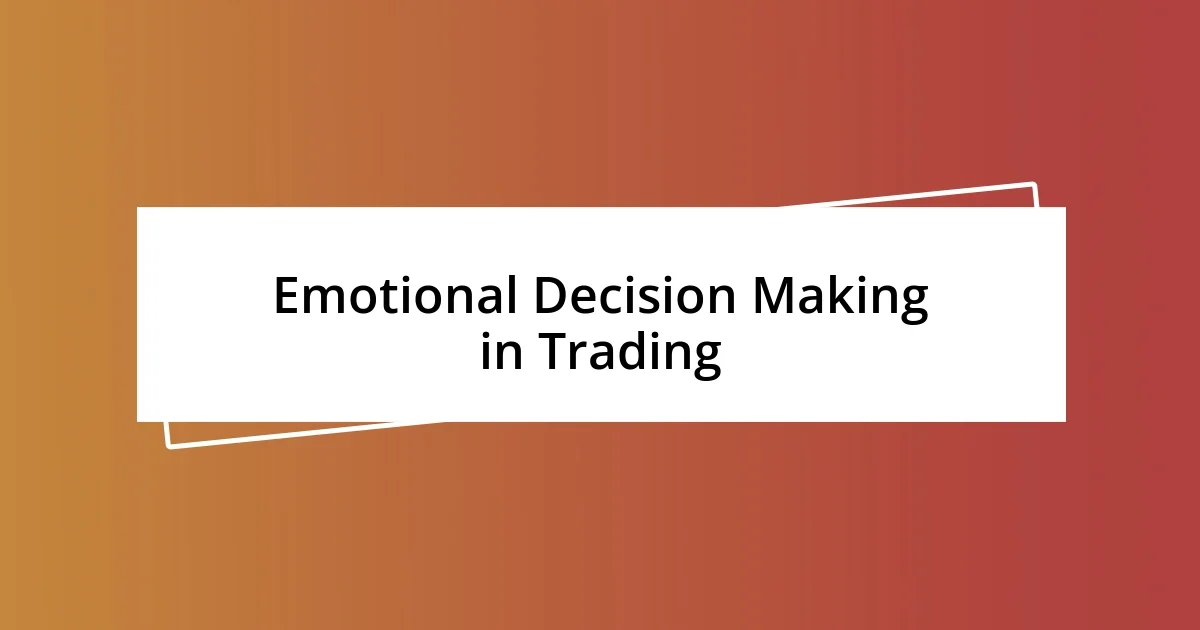
Emotional Decision Making in Trading
Trading isn’t just about numbers; it’s a deeply emotional experience. I once made a hasty decision to sell a coin I believed in because I feared losing my profits after a minor dip. In that moment, the thrill of watching the price rise turned into anxiety, leading to a hasty exit. Looking back, I realize that my fear, not logic, dictated my actions, costing me potential gains when the price bounced back beautifully. It’s a vivid reminder of how emotional decision-making can cloud our judgment.
When I reflect on my trading habits, I see a pattern: my biggest regrets often stem from fear or greed. There was a time I raced to buy a popular token at its peak, driven by the fear of missing out (FOMO). The adrenaline was intoxicating until the realization hit—I didn’t fully research what I was investing in. Soon after, the price dropped sharply. That experience taught me the importance of emotional regulation. I now prioritize pausing, taking a step back, and assessing my feelings before making a move.
Have you ever acted impulsively during a market surge or drop? I know I have. Emotional decision-making, particularly fueled by excitement or panic, often creates poor outcomes. I’ve learned to pause, breathe, and remind myself of my strategy during those tumultuous moments. By shifting my focus from the immediate thrill to the long-term vision, I find I make decisions that resonate more with my investment goals. Balancing emotions with informed choices is the key to navigating the crypto landscape more effectively.
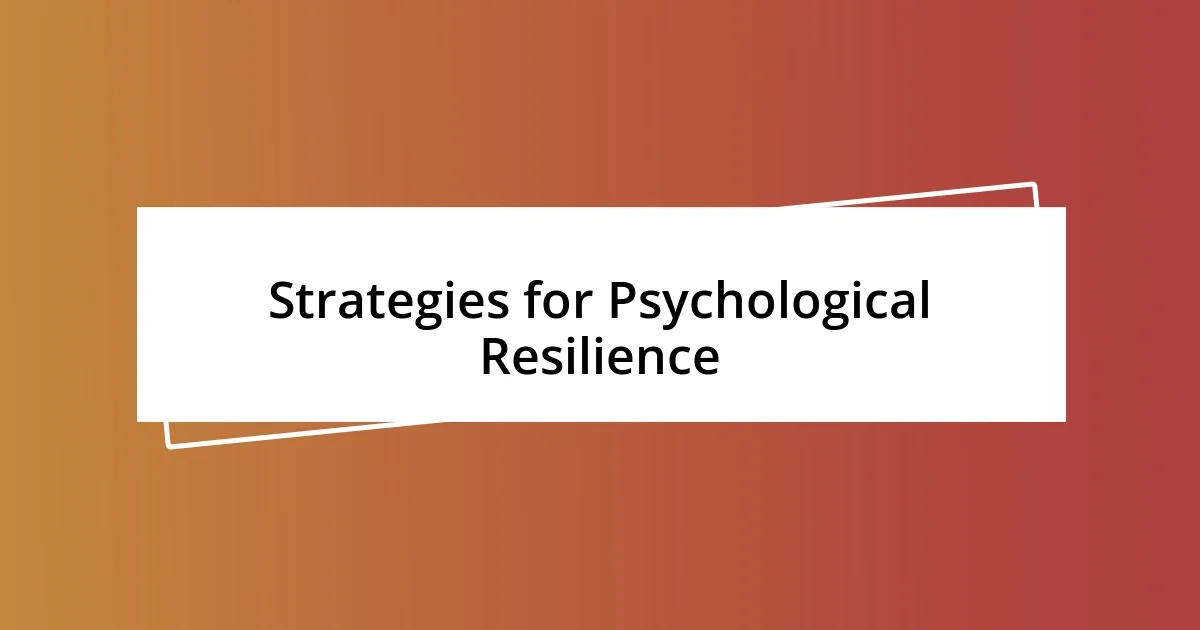
Strategies for Psychological Resilience
Building psychological resilience in the face of market volatility is essential for any trader, especially in the crypto space. After experiencing a harsh price drop, I found myself overwhelmed with frustration. In that moment, I made it a priority to focus on my emotional well-being. I started implementing small rituals, like taking daily walks or meditating, to ground myself. These habits helped me refocus my thoughts and regain confidence in my strategy, illustrating how self-care can be a powerful ally amidst uncertainty.
Another strategy that has served me well is maintaining a trading journal. Writing down my thoughts, feelings, and decisions during trades has made a significant difference. Not only does it reveal patterns in my emotional responses, but it also allows me to look back and reflect on my actions with a clearer mindset. I often ask myself: “What triggered that decision, and how did it align with my long-term goals?” This practice of self-reflection can transform our experiences into valuable lessons, reinforcing resilience and adaptability.
Lastly, setting predefined stop-loss orders has been a game changer for me. By determining ahead of time how much I’m willing to lose on a trade, I prevent myself from falling into emotional traps. It’s easy to panic in a downturn, but having that safety net allows me to think more clearly and stick to my original plan. I encourage you to consider how establishing similar safeguards might enhance your emotional resilience. How would you feel knowing you have a strategy that protects you from impulsive decisions? For me, it’s about empowerment and regaining control over my trading journey.

Cultivating a Rational Mindset
To cultivate a rational mindset, it’s essential to recognize the narratives we tell ourselves during trading. I once caught myself justifying a bad trade by saying, “This can’t drop much lower,” even as my gut told me otherwise. Learning to listen to that inner voice—and separating it from wishful thinking—helped me develop a mindset rooted in realism rather than fantasy.
Practicing mindfulness has become a game changer for me. During chaotic market swings, I often take a moment to breathe deeply and assess my reactions. It’s amazing how a few seconds of reflection can transform a flood of emotions into a clearer understanding of what I actually want. Consider this: how often do we let our thoughts dictate our feelings instead of the other way around? Shifting that dynamic can lead to much more balanced decision-making.
Lastly, I’ve found that surrounding myself with a supportive community helps foster rationality in my approach. I used to dive into trading forums filled with panic-driven chatter, which only amplified my anxiety. Now, I seek out perspectives that encourage a level-headed approach, reminding myself that investing is a marathon, not a sprint. Finding a circle that values reason over hype can truly make a difference—have you found your go-to group yet?




